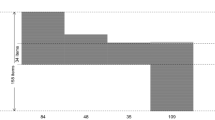Abstract
In this paper, we present a case study in collaboration with mathematics education and probability theory, with one providing the use case and the other providing tests and data. The application deals with the reason and execution of automation of difficulty classification of mathematical tasks and their users’ skills based on the Elo rating system. The basic method is to be extended to achieve numerically fast converging ranks as opposed to the usual weak convergence of Elo numbers. The advantage over comparable state-of-the-art ranking methods is demonstrated in this paper by rendering the system an inhomogeneous Markov Chain. The usual Elo ranking system, which for equal skills (Chess, Math, ...) defines an asymptotically stationary time-inhomogeneous Markov process with a weakly convergent probability law. Our main objective is to modify this process by using an optimally decreasing learning rate by experiment to achieve fast and reliable numerical convergence. The time scale on which these ranking numbers converge then may serve as the basis for enabling digital applicability of established theories of learning psychology such as spiral principal and Cognitive Load Theory. We argue that the so further developed and tested algorithm shall lay the foundation for easier and better digital assignment of tasks to the individual students and how it is to be researched and tested in more detail in future.
Supported by FFG Austria, project 41406789 called “Adaptive Lernhilfe”.
Access this chapter
Tax calculation will be finalised at checkout
Purchases are for personal use only
Similar content being viewed by others
References
Berg, A.: Statistical analysis of the Elo rating system in chess. CHANCE 33(3), 31–38 (2020)
Bruner, J.S.: The Process of Education. Harvard University Press, Cambridge (2009)
Chandler, P., Sweller, J.: Cognitive load theory and the format of instruction. Cogn. Instr. 8(4), 293–332 (1991)
Chaudhry, M.A., Kazim, E.: Artificial Intelligence in Education (AIEd): a high-level academic and industry note 2021. AI Ethics 2, 157–165 (2021). https://doi.org/10.1007/s43681-021-00074-z
Chung, K.L.: Markov chains with stationary transition probabilities. Die Grundlehren der Mathematischen Wissenschaften in Einzeldarstellungen Band 104, 1st (edn.). Springer, Berlin, Heidelberg (1967). https://doi.org/10.1007/978-3-642-49686-8
Rowe, D.E., Koreuber, M.: Proving It Her Way: Emmy Noether, a Life in Mathematics, 1st (edn.). Springer, Cham (2020). https://doi.org/10.1007/978-3-030-62811-6
Desmarais, M.C., Baker, R.S.J.D.: A review of recent advances in learner and skill modeling in intelligent learning environments. User Model. User-Adap. Inter. 22(1), 9–38 (2012). https://doi.org/10.1007/s11257-011-9106-8
Dobrushin, R.L.: Central limit theorem for nonstationary Markov chains I. Theor. Probab. Appl. 1(1), 65–80 (1956)
Embretson, S.E., Daniel, R.C.: Understanding and quantifying cognitive complexity level in mathematical problem solving items. Psychol. Sci. 50(3), 328 (2008)
Friso-van den Bos, I., van der Ven, S.H.G., Kroesbergen, E.H., van Luit, J.E.H.: Working memory and mathematics in primary school children: a meta-analysis. Educ. Res. Rev. 10, 29–44 (2013)
Geerlings, H., Glas, C.A.W., Van Der Linden, W.J.: Modeling rule-based item generation. Psychometrika 76(2), 337–359 (2011)
Geman, S., Geman, D.: Stochastic relaxation, Gibbs distributions, and the Bayesian restoration of images. IEEE Trans. Pattern Anal. Mach. Intell. 6, 721–741 (1984)
Hajek, B.: Cooling schedules for optimal annealing. Math. Oper. Res. 13(2), 311–329 (1988)
Fischer, G.H., Molenaar, I.W. (eds.) Rasch Models: Foundations, Recent Developments, and Applications, (1 edn.). Springer, New York (1995). https://doi.org/10.1007/978-1-4612-4230-7
Pelánek, R.: Applications of the Elo rating system in adaptive educational systems. Comput. Educ. 98, 169–179 (2016)
Plass, J.L., Moreno, R., Brünken, R.: Cognitive Load Theory (2010)
Rittle-Johnson, B.: Developing mathematics knowledge. Child Dev. Perspect. 11(3), 184–190 (2017)
Van Eck, R.: Digital game-based learning: it’s not just the digital natives who are restless. EDUCAUSE Rev. 41(2), 16 (2006)
Wasserman, L.: All of Statistics. STS, Springer, New York (2004). https://doi.org/10.1007/978-0-387-21736-9
Whyte, J., Anthony, G.: Maths anxiety: the fear factor in the mathematics classroom. New Zealand J. Teachers’ Work 9(1), 6–15 (2012)
Xiaolong, X., Zhang, X., Khan, M., Dou, W., Xue, S., Shui, Yu.: A balanced virtual machine scheduling method for energy-performance trade-offs in cyber-physical cloud systems. Fut. Gen. Comp. Sys. 105, 105 (2020)
Acknowledgments
We chose the name of our fictitious learner to be ‘Emmy’ in honor of the great Emmy Noether who received the first habilitation in Mathematics at a German University in 1919. Emmy Noether also received private math tutoring [6].
Furthermore, we would like to add our thanks to FFG - the Forschungs-förderungsgesellschaft from Austria for supporting our research financially.
Author information
Authors and Affiliations
Corresponding author
Editor information
Editors and Affiliations
Rights and permissions
Copyright information
© 2022 The Author(s), under exclusive license to Springer Nature Switzerland AG
About this paper
Cite this paper
Infanger, EM., Infanger, G., Lavicza, Z., Sobieczky, F. (2022). Applying Time-Inhomogeneous Markov Chains to Math Performance Rating. In: Kotsis, G., et al. Database and Expert Systems Applications - DEXA 2022 Workshops. DEXA 2022. Communications in Computer and Information Science, vol 1633. Springer, Cham. https://doi.org/10.1007/978-3-031-14343-4_2
Download citation
DOI: https://doi.org/10.1007/978-3-031-14343-4_2
Published:
Publisher Name: Springer, Cham
Print ISBN: 978-3-031-14342-7
Online ISBN: 978-3-031-14343-4
eBook Packages: Computer ScienceComputer Science (R0)




